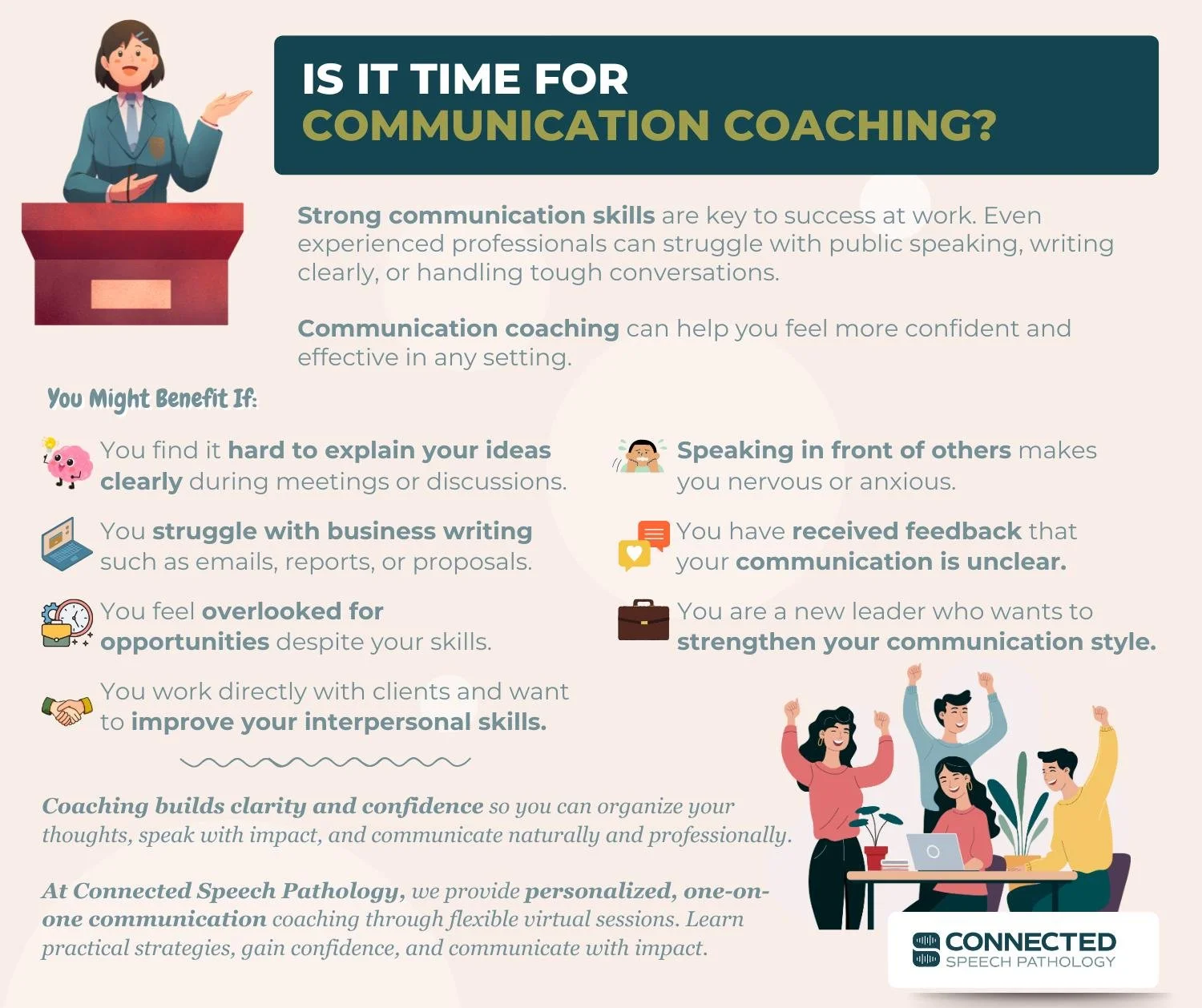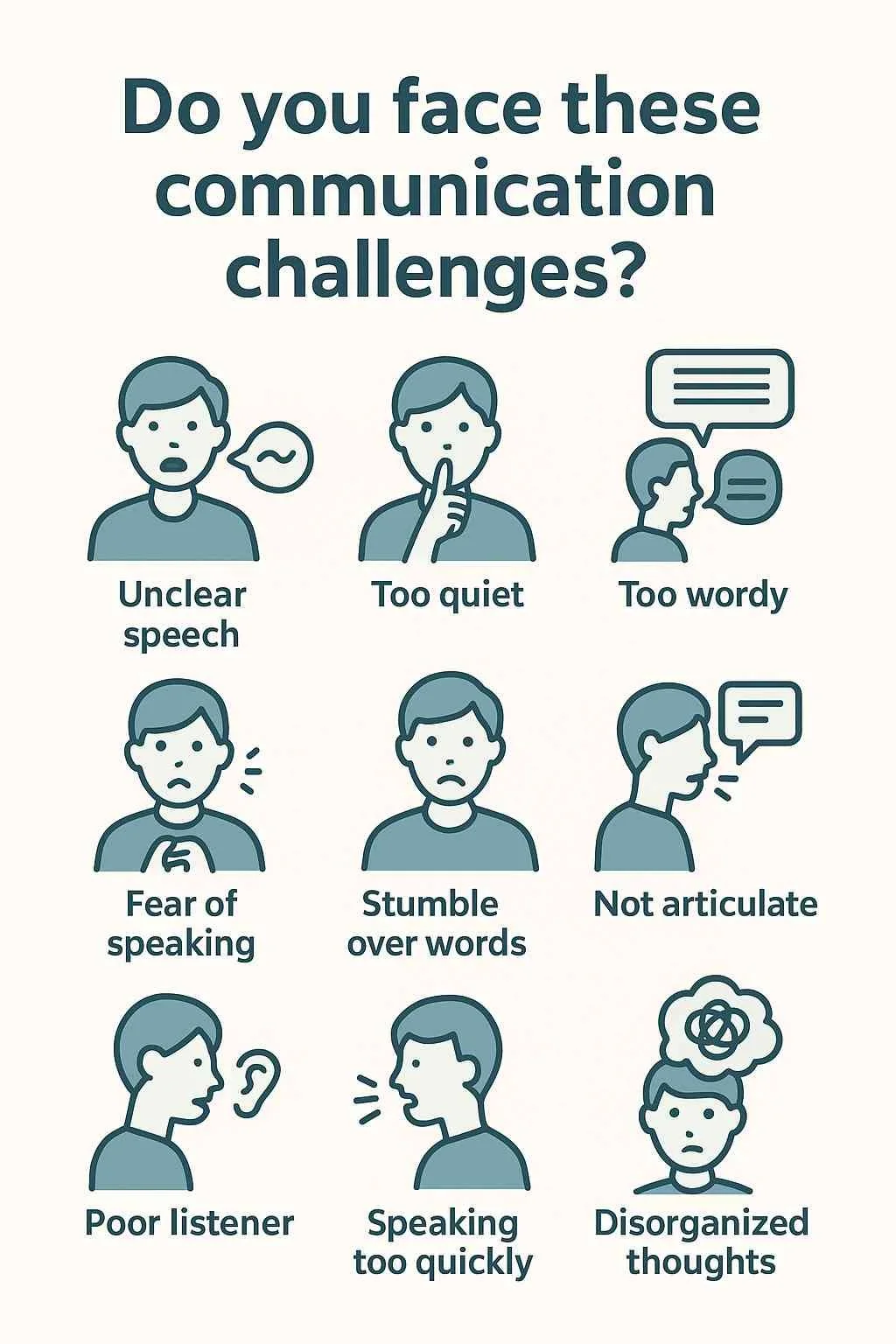Do I Need a Communication Coach? Here's How to Know
Your communication style affects leadership presence, career growth, and how well you connect with others. Even experienced professionals run into challenges like poor communication habits, trouble reading nonverbal cues, or losing confidence during presentations. These issues can hold you back from building relationships, leading effectively, or advancing in your career.
A communication coach helps you develop better communication skills. Executive communication training helps you speak with clarity, use body language to show you are listening, and build confidence during difficult conversations.
Many professionals find the coaching process life-changing because they leave with practical tools, constructive feedback, and ongoing support that create real progress.
Key Takeaways:
Communication challenges: Many professionals face issues with clarity, public speaking, listening skills, or leadership communication that hold them back at work.
Essential skills: Strong communication depends on clarity, tone of voice, body language, emotional intelligence, and adaptability in professional settings.
Coaching process: Communication coaching sessions combine practice, constructive feedback, and real-life scenarios in either group or one-on-one formats.
Professional growth: A communication coach helps build confidence, improve presentation skills, and strengthen overall communication style for career advancement.
Common Communication Challenges Professionals Face
Essential Skills for Effective Communication
How the Communication Coaching Process Works
What to Look for in a Good Communication Coach
Deciding If It’s the Right Step for You
Frequently Asked Questions About Communication Coaching
How Connected Speech Pathology Can Help You Improve Your Communication Skills
Common Communication Challenges Professionals Face
Many professionals ask the question: Do I need a communication coach? This question often arises when communication challenges start to impact leadership performance, hinder career growth, or create barriers in professional relationships.
Here are some common situations where effective communication is impacted:
Leadership communication
Leaders often struggle with poor communication habits that create confusion or frustration within their teams. For example, a manager who gives vague instructions may notice projects going off track, while one who avoids eye contact during meetings may seem unapproachable.
Communication coaching helps leaders learn to provide clear direction, use body language that builds trust, and lead conversations in a way that motivates employees.
Accent clarity and vocal presence
Being poorly understood during meetings or presentations can affect credibility. For instance, a multilingual professional may have their ideas overlooked because colleagues struggle to follow their speech, or someone with a weak vocal presence may get interrupted often. A communication coach provides feedback on accent clarity, pacing, and projection so your voice supports your message.
Fear of public speaking
Many professionals seek help with public speaking skills. Physical symptoms such as shaky hands, a racing heart, or a blank mind can take over before a presentation even begins. This fear of public speaking often leads to avoiding opportunities to speak up in meetings or declining invitations to present. Communication coaching provides tools to manage anxiety, practice in a safe environment, and build confidence so public speaking becomes less intimidating and more effective.
Difficult conversations
Workplace conflict often becomes harder when interpersonal communication breaks down. For example, a manager giving feedback may sound too harsh, while another may avoid the conversation altogether. Communication coaching helps professionals build emotional intelligence, manage tone, and use nonverbal cues to handle difficult conversations with respect and clarity.
Active listening skills
Many professionals focus on speaking well but forget that listening is just as important. In team discussions, someone who interrupts or fails to reflect back what others say may come across as dismissive.
Communication coaching enhances listening skills that demonstrate empathy, foster trust, and deepen connections in leadership, teamwork, and client-facing situations.
Communication style
A communication coach helps refine the way you come across in professional settings. A leader who overuses filler words like “um” or “you know” may appear uncertain, while someone who avoids eye contact may seem disengaged. A communication coach helps refine tone of voice, body language, and delivery so your communication style projects confidence and professionalism.
Storytelling for business
A communication coach helps professionals use simple, clear storytelling to make complex ideas more memorable and persuasive. Communication coaching teaches how to use storytelling, gestures, and vocal variety to create deeper connections with your audience.
Essential Skills for Effective Communication
Effective communication relies on a core set of skills that influence how others respond to you in professional settings. Here are some examples:
Clarity: Clear expression avoids confusion. For example, a leader who speaks too quickly or mumbles during a presentation may lose the audience. In contrast, one who speaks eloquently at a steady pace with crisp articulation is easier to follow.
Active listening: Listening builds trust. In a performance review, giving full attention and reflecting back what an employee shares creates a stronger working relationship.
Body language: Nonverbal cues affect how messages land. Crossing arms in a meeting can signal disinterest, while an open posture encourages participation.
Eye contact: Eye contact shows confidence. A steady gaze during a presentation reassures your audience and keeps them engaged.
Tone of voice: Tone shapes meaning. A rushed, flat delivery in a client pitch weakens your message, while a measured, varied tone conveys confidence and authority.
Emotional intelligence: Reading emotions guides effective responses. In a tense team discussion, recognizing and addressing frustration directly can help defuse conflict.
Adaptability: Adjusting style improves connection. Explaining a technical process to senior leadership may require a different approach than presenting it to a new hire.
A communication coach helps identify which of these skills needs the most attention and creates practical ways to strengthen them. Real-life practice, constructive feedback, and ongoing support help these skills become ingrained, leading to improved communication across all professional settings.
Improve Speech Skills for Strong and Effective Communication
Check out our blog on how to improve speech skills for strong and effective communication!
How the Communication Coaching Process Works
Communication skills training begins by identifying areas where communication challenges are holding you back. A communication coach helps you set clear communication goals, whether that means building executive presence, improving presentation skills, or becoming a more effective communicator. From there, the coaching program is designed around your needs with a coaching style that fits your personality and professional setting.
You can choose between group coaching sessions or one-on-one coaching. In group coaching, you may be limited by the pace and topics set for the group, but you benefit from hearing various perspectives and practicing with peers.
In one-on-one coaching, the experience is tailored to your specific goals and daily challenges. You can bring real-life examples to the session, receive direct feedback, and practice new skills in a safe and supportive environment.
Business communication coaches often provide online resources outside of sessions, such as apps, video exercises, or guided worksheets, to make training more accessible and convenient. Some professionals prefer in-person presentations and practice, but many have turned to virtual coaching services for the convenience and accessibility. In both formats, you work closely with your communication coach to learn essential skills you can apply immediately in professional settings.
What to Look for in a Good Communication Coach
Finding the right coach makes a big difference in your growth. A good coach has experience working with a diverse range of professionals, from seasoned leaders to those preparing for promotions. Past clients often highlight how coaching services have helped them build confidence, refine their presentation skills, and strengthen their leadership communication.
When comparing potential coaches, ask about their coaching style and how they adapt the coaching program to individual needs. Some professionals want structured lessons, while others benefit from bringing real-life challenges into each session. A communication coach is most effective when they provide constructive feedback, ongoing support, and clear strategies that can be applied in professional settings.
It also helps to think about format. Do you want in-person coaching for presentations or virtual coaching services for flexibility? The right coach works closely with you in the setting that matches your goals, whether that means preparing for a keynote speech, handling difficult conversations, or improving day-to-day communication with your team.
In some cases, speech pathologists also work as communication coaches. Speech therapy often addresses clinical needs such as articulation disorders, voice conditions, or stuttering.
Communication coaching focuses more on professional growth, leadership communication skills, and improving overall communication style in workplace settings. While different in scope, both approaches build more assertive, more confident communicators.
Deciding If It’s the Right Step for You
The question "Do I need a communication coach?" often comes down to your goals and the challenges you face in daily professional life. Think about moments when poor communication has limited your impact. If these moments continue to repeat, communication skills training may be beneficial.
Ask yourself:
Do I struggle with clarity or confidence during high-stakes conversations?
Have I missed opportunities for promotion because of weak communication skills?
Do I avoid public speaking or presentations because I feel unprepared?
Am I looking for more confidence in interviews, networking events, or client meetings?
If you answered yes to any of these, a communication coach helps turn those challenges into opportunities for growth.
Frequently Asked Questions About Communication Coaching
1. How long should a communication coaching session last?
Most communication coaching sessions last between 45 and 60 minutes. This gives enough time to review progress, practice new skills, and receive constructive feedback without feeling rushed. Some communication coaches also offer extended sessions for in-depth presentation practice or intensive training.
2. How many communication coaching sessions do I need?
The number of communication coaching sessions depends on your goals. Some professionals only need a few sessions to prepare for a keynote speech or job interview, while others benefit from ongoing support to strengthen leadership communication skills over time. Your communication coach will recommend a plan that fits your needs.
3. How much does a communication coach cost?
Costs vary based on the communication coach’s experience, location, and the type of program offered. Group communication coaching is often more affordable, while one-on-one coaching services tend to be higher in price due to the personalized attention. Many business communication coaches also provide package options for longer-term support.
4. What is a typical communication coaching experience like?
A communication coaching experience usually combines assessment, practice, and feedback. You may start by identifying areas where your communication style needs improvement, such as clarity, tone, or body language. Communication coaching sessions then focus on real-life scenarios, giving you the chance to practice and apply new skills in a supportive environment.
How Connected Speech Pathology Can Help You Improve Your Communication Skills
Connected Speech Pathology offers online communication coaching services designed for professionals in leadership, management, and client-facing roles. Our communication coaches are licensed speech pathologists with expertise in both speech therapy and professional communication training. This unique background enables us to address challenges with clarity, vocal presence, or accent, while also helping with leadership communication, presentation skills, and executive presence.
Through individualized online communication coaching sessions, we focus on your specific communication goals. You may practice public speaking, refine your communication style, or prepare for real-life situations like interviews, networking events, or team meetings. Our communication coaching program combines effective techniques, constructive feedback, and ongoing support so you can build confidence and improve your communication skills in professional settings.
Past clients have used online communication coaching with Connected Speech Pathology to prepare for promotions, lead meetings more effectively, and strengthen their ability to connect with diverse audiences. Working closely with our communication coaches gives you practical tools and a coaching experience that helps you grow into a more confident communicator in both professional and personal situations.
Summary
Strong communication shapes leadership presence, career growth, and workplace relationships. A communication coach helps professionals overcome challenges such as unclear speech, weak vocal presence, or difficulty leading conversations.
Through communication coaching sessions, you can strengthen essential skills like clarity, body language, emotional intelligence, and public speaking.
About the Author
Allison Geller is a communication coach, speech-language pathologist, and founder of Connected Speech Pathology, an international online practice providing professional communication coaching and speech therapy for children, teens, and adults. With more than two decades of experience, she has worked in medical and educational settings, published research on aphasia, and leads a team of specialists helping clients improve skills in public speaking, vocal presence, accent clarity, articulation, language, fluency, and interpersonal communication.










